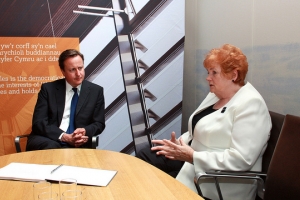Support migrant centric journalism today and donate

An opinion poll has showed that people in the UK are much more likely to view membership of the EU negatively than people in France, Germany or Poland. 26% of British people are broadly in favour of EU membership whereas 42% see Britain's membership of the EU as a bad thing.
By far the most unpopular aspect of EU membership among British respondents was immigration. Only 14% of respondents thought immigration into the UK from within the EU was a good thing whereas 64% thought it was not a good thing.
The poll was conducted by polling company Opinium which questioned 5,000 people in the UK, France, Germany and Poland. Only in the UK were respondents more likely to oppose membership than support it. In France, 36% of respondents saw EU membership as a good thing against 34% who saw it as a bad thing.
Continental opinion favours EU membership
In Germany and Poland, public opinion is much more firmly in support of the EU. 55% of Germans support membership against only 17% who oppose it. In Poland, 62% are in favour of membership and only 13% are against it.The pollsters say that the UK seems to be less positive about EU membership because people in the UK do not feel 'European' in the way that continental Europeans do.
The UK's relationship with the rest of the EU is a difficult one. The UK's press is, on the whole, opposed to immigration, and several tabloid newspapers, led by The Daily Express, frequently publish articles which predict a 'wave' of immigration from Romania and Bulgaria in 2014.
Transitional controls on Bulgaria and Romania
Bulgaria and Romania joined the EU in 2007. The UK, in common with other western EU countries including France and Germany, placed 'transitional controls' on Romanians and Bulgarian citizens preventing them from migrating to live and work unless they were self-employed (or to work in their own company) or could meet certain immigration criteria.These controls will expire on December 31st 2013 so, after that, Romanians and Bulgarians will be free to come to the UK to work. It should be noted that even during the transitional period there were a number of special immigration categories that made it easier for Bulgarians and Romanians to gain entry to the UK compared to non EU nationals.
The anti-immigration pressure group Migrationwatch UK predicts that there will be 50,000 people who come from the two countries each year for at least five years. Migrationwatch points to 2004 when Poland and seven other eastern European countries joined the EU.
13,000 people a year
At that time the UK government did not put transitional controls in place to restrict immigration. The UK government predicted that 13,000 people would come from the eight countries each year.As it was, it is believed that about 600,000 people came from Poland by the end of 2006 with many more coming from the other new EU countries including from Slovakia, Hungary and the Baltic states of Latvia, Lithuania and Estonia.
The UK Prime Minister David Cameron has promised to allow a referendum on UK membership in the next parliament if he is re-elected at the next election. His right-wing Conservative Party is under pressure from the anti-EU UK Independence Party.
We must prevent 'vast migrations' – Cameron
Mr Cameron has promised to attempt to renegotiate the terms of Britain's membership of the EU. He wrote an article for UK paper The Financial Times on November 26th 2013 in which he said 'We must put in place new arrangements that will slow full access to each other's labour markets until we can be sure it will not cause vast migrations'.Mr Cameron says that, if he is re-elected and the referendum is held, he will campaign for the UK to remain within the EU. The Opinium poll suggests that that campaign might well be unsuccessful.
When asked whether they thought that Britain's departure from the EU would be likely to have a positive or a negative effect on the EU, more people from the continental countries thought that Britain's departure would be likely to be negative than thought it would be positive.
French oppose UK's departure from EU
31% of French respondents thought that the UK's departure would be harmful against 20% who thought it would be positive.36% of German respondents and 51% of Polish respondents said that the UK's departure would be harmful against 19% of Germans and 14% of Poles who said it would be positive.
The high number of Poles who worry about the negative impact of UK departure is likely to be caused by the fact that there are currently thought to be over 1m Polish nationals living in the UK. They may fear that a UK exit from the EU might affect the right of Poles to stay in the UK.
50% of Britons want to leave EU
The poll shows that 50% of Britons would vote for the UK to leave the EU against only 36% who would vote for it to stay in. The gap between the two sides has narrowed in the last year from 58% to 30%.A cross-party group of senior pro-Europe UK politicians intends to campaign to raise awareness of the benefits of EU membership before any referendum is held.
If you would like to apply for a visa WorkPermit.com can help. WorkPermit.com is a specialist visa consultancy with 25 years of experience dealing with visa applications. We can help with a wide range of visa applications to your country of choice. Please feel free to contact us for further details.





















